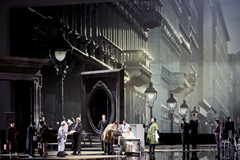| Opera Reviews | 19 April 2024 |
A luxurious production with much entertainment valueby Moore Parker |
|
| Strauss, R: Der Rosenkavalier Salzburg Festival 23 August 2014 |
|
|
This quasi-debut in Salzburg results in a broadened perspective of Baron Ochs and as such, one likely to have found favor with Strauss, whose original working title for the opera was Ochs auf Lerchenau. Director Harry Kupfer and his team (sets: Hans Schavernoch, costumes: Yan Tax, lighting: Jürgen Hoffmann) have set the piece in the heyday of Vienna’s fin de siècle – the final glorious days before the end of the empire. Full-scale projections on the vast backdrop of the Festspielhaus stage deftly blend from downtown Vienna to the Prater Allee and so on, while furnishings (some, such as the Marschallin’s enormous mirror, over-sized in dimension) and props augment the stunning period costumes. Lavish and grand, the images are a delight - if however emphasizing the expanse of the stage and dwarfing the characters somewhat. The protagonists also face a similar challenge on the musical side of the proceedings: Franz Welser-Möst chose to have the pit raised to the level Karajan favored, undoubtedly facilitating greater orchestral transparency, but presenting new (and in part, unresolved) challenges in terms of stage to pit balance. The ensemble playing was a delight – indeed, an event in itself - but at times overwhelmed the soloists who, if even audible, were certainly not comprehensible. Undertaking the role for the first time, Günther Groissböck at age 37 is a tailor made choice for this unconventional Ochs. With a touch of Ralph Fiennes’ air and image, this is a suave – if vulgar – bon vivant and bully rather than the typical bufforesque country bumpkin of most standard readings. Groissböck’s voice corresponds: a seamless, velvety bass-baritone which just encompasses Och’s wide range, but which however lacks the cavernous depth, bite, and indeed personality of some of his illustrious predecessors. Sophie Koch’s Octavian is no longer the fresh rosy-cheeked youth of former years, at times appearing intent at projecting her tone across the footlights (albeit successfully, but lacking either a sense of vocal reserve or ease with enunciation). Committed and stylish as always, her Octavian convinces more than her Mariandl – who didn’t really pass as the awkward pubescent youth playing a girl either vocally or dramatically. Of the supporting roles, Stefan Pop presented a nicely-rounded Italian Singer, Tobias Kehrer a particularly vibrant Polizeikommissar, Silvana Dussmann a larger-than-life Jungfer Marianne Leitmetzerin, and Wiebke Lehmkuhl an imposing Annina. Adrian Eröd seemed a shade under-sized as Faninal, but pulled out all available stops as the evening progressed. This was a luxurious production with much entertainment value – on reflection, one ideal for the condensed métier of television or the intimate screen where detail is advantaged and acoustic issues are alleviated.
|
|
| Text ©
Moore Parker Photo © Salzburger Festspiele / Monika Rittershaus |

 First seen in Salzburg in 1929 and featured at festivals here well over a hundred times, Der Rosenkavalier had to wait until this production for its first Salzburg airing in its original uncut version. The world premiere in Dresden in 1911 suffered the censor’s pen, and tradition (even Karajan’s legendary production which opened Salzburg’s Grosses Festspielhaus in 1960) has generally followed suit and respected the cuts.
First seen in Salzburg in 1929 and featured at festivals here well over a hundred times, Der Rosenkavalier had to wait until this production for its first Salzburg airing in its original uncut version. The world premiere in Dresden in 1911 suffered the censor’s pen, and tradition (even Karajan’s legendary production which opened Salzburg’s Grosses Festspielhaus in 1960) has generally followed suit and respected the cuts. 





